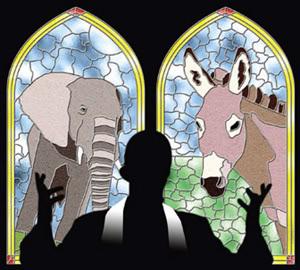Over at The Dish, Andrew Sullivan argues that the Tea Party is like a religion (and is driven in large part by people who fuse religion with politics). I don’t have any problems with his analysis and think he is largely correct. However, the unstated premise of Andrew’s piece is that his position stands in contrast: that is not like religion. This is false. His politics are no less “religious” than those of Tea Partiers.
All nation-states, even supposedly secular ones, cultivate a civil religion for purposes of cohesion and legitimacy. Political discourse is, as a consequence, structurally and functionally similar to religious discourse. In this revealing passage, we can see how Andrew contrasts their civil religion with his own:
This is a religion – but a particularly modern, extreme and unthinking fundamentalist religion. And such a form of religion is the antithesis of the mainline Protestantism that once dominated the Republican party as well, to a lesser extent, the Democratic party.
It also brooks no distinction between religion and politics, seeing them as fused in the same cultural and religious battle. Much of the GOP hails from that new purist, apocalyptic sect right now – and certainly no one else is attacking that kind of religious organization. But it will do to institutional political parties what entrepreneurial fundamentalism does to mainline churches: its appeal to absolute truth, total rectitude and simplicity of worldview instantly trumps tradition, reason, moderation, compromise.
In opposition to “extreme, fundamentalist, purist, unthinking, apocalyptic” political religion, we get Andrew’s preferred form of political religion: traditional, reasoned, moderate, and compromising.
This is a form of argument favored by progressive, liberal, and ecumenical Christians when they oppose or bemoan the excesses of their “fundamentalist” brethren. We sometimes see Muslims do the same thing when they feel compelled to defend Islam against the violent actions of their “fundamentalist” brethren. These are the kinds of arguments that are on regular display in the Huffington Post’s religion section. In that forum, ecumenical religionists of all stripes write articles reassuring one another that their preferred form of faith is — if read in the proper educated and moderate way — peaceful, progressive, and loving.
While I have considerable sympathy for all these moderates, this doesn’t mean their positions are any less “religious” than the others. They are just different.


